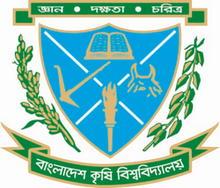Ethical standards are crucial to ensure the high quality of scientific publications, credibility of scientific findings, and that authors receive credit for their work. As such, the Journal of Bangladesh Agricultural University (JBAU) is committed to upholding standards of ethical behavior at all stages of the publication process.
JBAU strictly abide by the publication ethics (Best Practice Guidelines) as specified by the DOAJ
Article Assessment
All manuscripts are subject to peer review and are expected to meet standards of academic excellence. If approved by the editor, submissions will be considered by peer reviewers, whose identities will remain anonymous to the authors.
Our Research Integrity team will occasionally seek advice outside standard peer review, for example, on submissions with serious ethical, security, biosecurity, or societal implications. We may consult experts and the academic editor before deciding on appropriate actions, including but not limited to recruiting reviewers with specific expertise, assessment by additional editors, and declining to further consider a submission.
See detailed reviewing process here.
Plagiarism
Plagiarism means the use of any material and ideas developed or created by another person without acknowledging the original source. To avoid any form of plagiarism, each manuscript newly submitted to the JBAU Office will be checked regarding plagiarism using PlagScan. The decision on whether a manuscript should be rejected because of fraud or should proceed to the peer-review process rests with the handling editor. The similarity reports are also made available to referees.
Data Fabrication and Falsification
Data fabrication means the researcher did not actually do the study, but made up data. Data falsification means the researcher did the experiment, but then changed some of the data. Both of these practices make people distrust scientists. If the public is mistrustful of science then it will be less willing to provide funding support.
The authors of submitted manuscripts or published articles that are found to have fabricated or falsified the results, including the manipulation of images, may incur sanctions, and published articles may be retracted.
Citation Manipulation
Any manipulation of citations (e.g. including citations not contributing to a manuscript’s scientific content, citations solely aiming at increasing an author’s or a journal’s citations) is regarded as scientific malpractice.
Editors and reviewers must not ask authors to include references merely to increase citations to their own or an associate’s work, to the journal, or to another journal they are associated with.
Author Contribution and Funding Statement
All authors listed on a manuscript submitted to JBAU must have contributed a significant part to it. Vice versa, all persons who contributed to the presented work need to be named in the list of authors.
Authors must declare current or recent funding (including article processing charges) and other payments, goods or services that might influence the work. All funding, whether a conflict or not, must be declared in the ‘Acknowledgments’.
Conflicts of Interest
Conflicts of interest occur when issues outside research could be reasonably perceived to affect the neutrality or objectivity of the work or its assessment. Potential conflicts of interest must be declared – whether or not they actually had an influence – to allow informed decisions. In most cases, this declaration will not stop work from being published nor will it always prevent someone from being involved in a review process.
If unsure, declare a potential interest or discuss with the editorial office. Undeclared interests may incur sanctions. Submissions with undeclared conflicts that are later revealed may be rejected. Published articles may need to be re-assessed, have a corrigendum published, or in serious cases be retracted.
Conflicts include the following:
- Financial – funding and other payments, goods and services received or expected by the authors relating to the subject of the work or from an organization with an interest in the outcome of the work
- Affiliations – being employed by, on the advisory board for, or a member of an organization with an interest in the outcome of the work
- Intellectual property – patents or trademarks owned by someone or their organization
- Personal – friends, family, relationships, and other close personal connections
- Ideology – beliefs or activism, for example, political or religious, relevant to the work
- Academic – competitors or someone whose work is critiqued
Authors
Authors must declare all potential interests in a ‘Conflicts of interest’ section, which should explain why the interest may be a conflict. If there are none, the authors should state “The author(s) declare(s) that there are no conflicts of interest regarding the publication of this paper.” Submitting authors are responsible for coauthors declaring their interests. Declared conflicts of interest will be considered by the editor and reviewers and included in the published article.
Editors and Reviewers
Editors and reviewers should decline to be involved with a submission when they
- Have a recent publication or current submission with any author
- Share or recently shared an affiliation with any author
- Collaborate or recently collaborated with any author
- Have a close personal connection to any author
- Have a financial interest in the subject of the work
- Feel unable to be objective
- Have previously discussed the manuscript with the authors
Sanctions
If JBAU office becomes aware of breaches of the above-mentioned publication ethics policies, the following sanctions may be applied:
- Rejection of the manuscript and any other manuscripts submitted by the author(s).
- Not allowing submission for 1-3 years.
- Prohibition from acting as an editor or reviewer.
Corrections and Retractions
When errors are identified in published articles, the JBAU Editorial office will consider what action is required and may consult the editors and the authors’ institution(s).
Errors by the authors may be corrected by a corrigendum and errors by the publisher by an erratum. If there are errors that significantly affect the conclusions or there is evidence of misconduct, the article may be retracted. The author(s) will be notified of the process of retraction and given a chance of appeal to the JBAU office against the decision.
